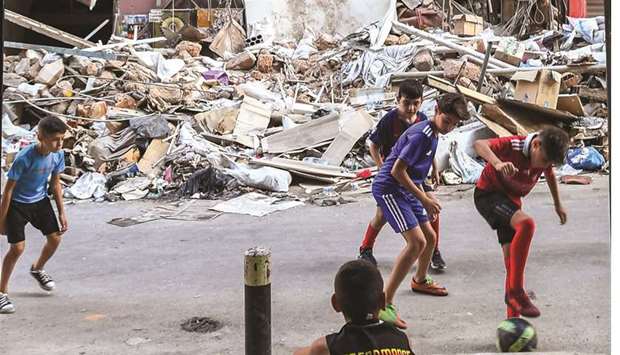French President Emmanuel Macron yesterday warned that Lebanon risks a return to civil war if it is left alone to deal with the crisis that followed the deadly Beirut port explosion this month.
Macron was speaking as he prepared to head to Lebanon on Monday in a new bid to press its leaders to undertake radical reform in the wake of the explosion this month that left 181 dead.
“If we let Lebanon go in the region and if we somehow leave it in the hands of the depravity of regional powers, it will be civil war” as well as “the defeat of what is the very identity of Lebanon,” he said.
Paris is impatient over the lack of progress in forming a new government to undertake reform in the aftermath of the blast, which was blamed on a store of ammonium nitrate left for years in a warehouse.
Many Lebanese have blamed the disaster on a ruling class they charge as being mired in nepotism, corruption and neglect since the 1975-1990 civil war.
Macron spoke of the “constraints of a confessional system” in a country populated by Christians, Sunni Muslims and Shias.
But he said that added to this was “what can be mildly described as vested interests” and this had led to “a situation where there is hardly any (political) renewal and where there is there is almost an impossibility of carrying out reforms.”
He insisted that France would follow a policy of being “demanding without interfering” and awaited reforms like passing an anti-corruption law and reforming public contracts, the energy sector and the banking system.
“If we do not do this, the Lebanese economy will collapse” and “the only victim will be the Lebanese people (...) who cannot go into exile”, he warned.
He extolled Lebanon’s multi-confessional make-up saying it “is perhaps one of the last existing forms” in the Middle East of the “peaceful possible coexistence of religions” and a pluralist system based on “education and culture”.
President Macron will also meet iconic singer Fairuz and members of Lebanon’s political leadership, the Elysee said yesterday.
One of his first meetings after arriving on Monday will be with Fairuz, one of the rare figures in Lebanon who is admired across the multi-confessional country, the Elysee said.
Fairuz, 85, is famously private and rarely seen in public but throughout her career has roused fans with her songs about love and in praise of the beauty of her troubled nation.
Karim Emile Bitar, a political science professor in France and Lebanon, tweeted yesterday it was an “excellent decision” by Macron to meet Fairuz, describing her as “arguably the most iconic, dignified and consensual Lebanese figure.”
UN to renew peacekeeping mandate
The UN Security Council is to extend the mandate for a peacekeeping force in southern Lebanon for another year, but will reduce the number of troops amid US and Israeli criticism over the mission’s efficiency, diplomats said.
The UN Interim Force in Lebanon (Unifil) — established in 1978 — patrols Lebanon’s southern border, known as the Blue Line, with Israel.
The United States and Israel have argued that the force needs to be smaller but with more powers and more access to areas controlled by Hezbollah.
They have pointed to recent incidents on the border in areas monitored by Unifil as examples of why the force should be bolstered.
Israel struck Hezbollah targets on Wednesday after it said it had come under attack.
The renewal of the UN mission comes as Lebanon grapples with a financial crisis, political deadlock and the aftermath of a blast that killed more than 180 people.
France, overseeing the resolution’s progress at the United Nations, circulated a final compromise draft on Thursday, which was put to a vote yesterday afternoon.
The troop ceiling was lowered from 15,000 to 13,000 to meet a key US demand, though one diplomat called that a symbolic change as only 10,500 troops are currently deployed.
A French presidential official said the renewal was now certain. “It’s important for Lebanon and Israel,” the official said. “What’s expected from Hezbollah is that it doesn’t do anything that could lead to an escalation.”
A second Western diplomat said also said the mandate would be renewed.
The United States was satisfied because it called for a detailed plan to improve the efficiency of the mission and report back to the council within 60 days, the diplomat said.
The resolution, seen by Reuters, has also been toughened, asking for Unifil to have access to tunnels discovered on the Blue Line, and for the Lebanese authorities to investigate them.
It condemns efforts to restrict the mission’s movements.

Children play with a football past rubble and destruction along a street in the Gemmayzeh district of Lebanon’s capital Beirut yesterday, in the aftermath of the monster blast at the nearby port which devastated the city.
